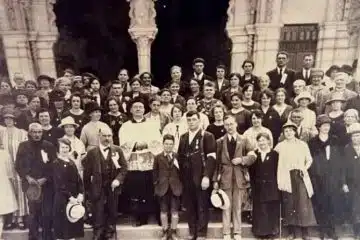Raised on Love
One of the most admirable qualities of the handymen, carpenters and manual laborers in my life is their deep love for their families and serving others. They might be messy or rough around the edges, but they come when we need them—even when the word “need” is used loosely. And though they may tease us, we know they love us and that we couldn’t make it without their help. We need more handymen!
Where do we suppose they learned to be so readily available to their families and neighbors? There are numerous factors that play into this, but anyone who knows a handyman personally knows they’ve been at this for a long time. Many tinkered as young as three-years-old, their parents giving them small, simple, practical tasks to help around the house, such as picking up sticks before their dads mow the lawn.
They helped their parents and were trusted with tasks and responsibilities from a very young age. In return, they were graced to see these completed tasks lighten the heavy loads their parents were carrying.
We can imagine that Jesus was likely raised that way. Did He grumble and complain? No. He knew it was good that He existed. He knew He was loved and had the capacity to change other people’s lives through that same love. Jesus also knew that those people God put in His life were the ones who needed Him most: his family and neighbors. He helped carry His parents’ crosses, and He truly fulfilled the law’s call to “Honor your father and mother.”
Now, this is not to say handymen are perfect human beings. As St. Paul said 2,000 years ago, “all men have sinned.” I am sure many, when being asked by their parents to help with a chore, grumbled at least once growing up. They also likely fell short and refused to help (and maybe suffered the consequences). Regardless of any shortcomings, their virtue shines through. There are many admirable qualities to be found in these handymen, qualities that are too often overlooked and taken for granted.
For many of them, their loving contributions to their childhood homes grew with time and blossomed into their adult lives under the beautiful (or too often ignored) title of “duty.”
So, what is the lesson we can learn from handymen and their families? A simple take away is this: “The Word became flesh and picked up a hammer.” This incredible quote by Jacob Imam beautifully captures the heart of a handyman’s life. Christ didn’t come to take away our suffering or the toils of work. Rather, He came to use them as tools for our purification, tools to help us more fully enter into the beauty and incredible wonders of our new lives in heaven.
What does this mean for our families? It means one of the greatest gifts we can give our children is the freedom to encounter the toils and difficulties of work early in their lives, so that when they encounter the harsh realities of adult life in our broken world, they are able to carry their many burdens like a handyman: with love.
 Trenton Scroggins is the Director of Digital Engagement for the Archdiocese of Cincinnati. [email protected]
Trenton Scroggins is the Director of Digital Engagement for the Archdiocese of Cincinnati. [email protected]
This article appeared in the November 2023 edition of The Catholic Telegraph Magazine. For your complimentary subscription, click here.













